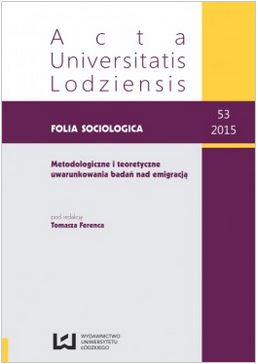Edukacja – emancypacja – emigracja. Sytuacja polskich artystek na przełomie XIX/XX wieku
Education – emancipation – emigration. The situation of Polish artist-women in the 19th and early 20th centuries
Author(s): Ewelina Wejbert-WąsiewiczSubject(s): Social Sciences, Fine Arts / Performing Arts, Sociology, Migration Studies
Published by: Wydawnictwo Uniwersytetu Łódzkiego
Keywords: Polish artist-woman; emigration; art
Summary/Abstract: The aim of this article is to describe the socio-historical situation of Polish artists-women (in the late 19th and early 20th centuries), who were going abroad in order to get an education. Through selected “case studies” (biography and artistic creation) showing relationship that occurred between education, immigration, and the fate of the works of painters-women. The cited names of women are known, but also unknown in the art circuit. The reasons for the absence of painters-women in the history of art are complex. It seems that one of the factors of this condition may be emigration. If the artists-women were popular abroad, often overlooked their talent in the country, and their art was absent in the homeland. In turn, successful career abroad did not mean recognition in Poland. An important aspect of the discussion is the issue of women’s socio-cultural role, especially in terms of autonomy, authority, obligations. The article is a sketch to referring to the sociology of artist, art history and sociology of art. The source material were all kinds of studies and texts: historical books, scientific articles, journals, letters, written memories, diaries, an exhibition of paintings, albums, reviews, calendars works, documents of social and artistic life, press interviews.
Journal: Acta Universitatis Lodziensis. Folia Sociologica
- Issue Year: 2015
- Issue No: 53
- Page Range: 105-126
- Page Count: 22
- Language: Polish

